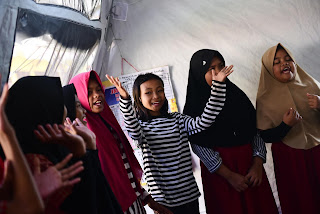By Lely Djuhari, UNICEF Communication Specialist
PALU, Indonesia 28 October
– A faint but a determined heartbeat has
returned to the provincial capital city of Palu in Indonesia’s Central
Sulawesi. A month after a powerful 7.4 magnitude earthquake and tsunami devastated
this once palm-fringed bayside area, 11-year-old girl Sophia Angelica Majid
woke up from her slumber on one sunny morning.
Her room is now a tent, shared
with nine other family members and neighbours. Her bed is a mattress, protected
by a mosquito net. Her morning routine now includes
showering or washing her face and hands with soap; brushing her teeth with water
from a large container at the end of a field dotted with white and khaki green canvas
temporary shelters.
She no longer has a school bag,
full of books. Her laptop, full of homework notes, computer games, and her
favourite Disney movies Frozen and Moana, is nowhere to be found.
With only one exercise book and
a pen, she started to get ready for her school day. Her mother Evni Majid bid
her goodbye as she busied herself filling in a city form to record that she, her
husband, Sophia and her two brothers were safe. Though it would be forever
imprinted in her mind how they ran desperately to get away from the waves that
engulfed large swathes of the shoreline. Sophia’s quick reaction made her grab
two mobile phones. They became the family’s lifeline in the following chaotic
days, trying to find food, drink and information on where the rest of the
family sought refuge.
On Sophia’s 30-minute-walk to
school amidst the debris, cars and motorbikes rumbled in the streets as her
hometown came back to life.
“Oh my, that entire wall is
gone,” Sophia gasped, as she arrived to SDN Inpres II Talise and gazed for the
first time the surreal landscape at the back of her school, which faced the
waterfront. “It’s heartbreaking. This used to be a neat row of school
buildings. There was a large housing complex over there. There used to be
durian fruit sellers (on the coastline). Now it’s all gone.”
Of the 202 students registered
at Sophia’s school only 70 from all the six grades showed up that day. However,
she and her friends sat down on the plastic-covered ground ready to learn the
first lesson of the day.
It's a long way from normal,
but it's a start.
UNICEF was the first UN agency to transport 94 metric tonnes of essential
emergency supplies through an airbridge from a neighbouring island of Borneo.
Sophie’s school was one of the first to receive the 450 school tents and 300
school-in-a-box that UNICEF has committed to deliver to over 1,400 affected
schools, more than184,000 children and nearly 13,000 teachers. UNICEF also
successfully advocated a standard-setting first as the Government procured
another 150 tents using UNICEF specifications.
The Head of the Education
Office Irwan Lahece has issued a back to school appeal. All schools are to
resume school from 8 to 11 AM in the morning, with an hour dedicated to
psychosocial support – singing, playing games, talking in a group or one-on-one
with the teachers about whatever is on their mind.
But aftershocks are still a
regular occurrence. Many parents fear that after surviving thus far, their
lives may still be changed for the worse. Officials are still confirming the
total number of children who have already regained access to education. They
will also step up efforts to clear up broken furniture, mangled metal pieces,
shards of glass from the school grounds. Another challenge for the coming
months is to set up latrines and handwashing facilities in the school tents.
The searing heat outside of the
not-quite-yet noon sun signalled that classes were over. The tent was
considerably cooler as the teachers raised the wall flaps to allow air to
circulate inside the 72-meter square room. The children – including Sophia -
lined up to receive a UNICEF white bag with exercise books, pens, rulers, an
eraser, a sharpener and crayons.
A bag full of hope to add to
her sole school possession of one note book and one pen.
“Education is for every child.
There are hundreds and thousands of children affected by the earthquake and
tsunami here. It’s time for them to go back to school and get a sense of
normalcy in their lives,” said Yusra Tebe, UNICEF Emergency Education
Specialist. He added that with the onset of a monsoon, in some areas their
hardships may be compounded by more landslides.
After school, Sophia and her older brother returned to her house stripped
of its roof, wooden walls, doors. Only a cement foundation is now left behind,
marking the four rooms of her house. She looks through the wreckage to try and
find some of her belongings, including her school uniform, shoes or sandals
without any luck. She manages to find a white frilly dress belonging to Tasha
her friend and promises to tell her of the find.
With the Government of
Indonesia leading the response, UNICEF was ready to support in the critical
hours and days after an emergency in Central Sulawesi. A six-month plan has
been completed. UNICEF now stands ready to support the Government, partners and
the community, as the emergency response moves into early recovery.








